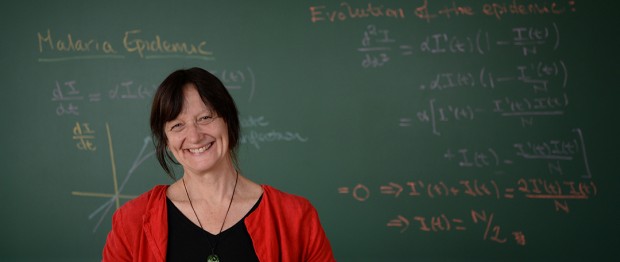
AS A LONG-TIME LEADER of EDGE (Enhancing Diversity in Graduate Education), Pomona College Professor of Mathematics Ami Radunskaya says she tries to instill some of her own innate stubbornness in young women seeking higher degrees in math. EDGE, founded in 1998, is a national mentoring program and summer workshop designed to encourage female mathematicians —particularly those from underrepresented groups—to persist in graduate study of math. Radunskaya was a member of the original EDGE faculty and has served as an instructor, mentor and organizer ever since its inception. Currently, Radunskaya is featured in the documentary film, The Empowerment Project, about “ordinary women doing extraordinary things.” Here’s how she became a role model for young women everywhere who are trying to build a career in mathematics.

Discover math as a toddler. At age 4, do math problems for fun and amuse guests at cocktail parties by showing your prowess in adding and subtracting. When challenged by your father, a professor of economics at UC Berkeley, with a tricky subtraction problem, invent negative numbers to solve it.

Start playing cello at age 9. Form a trio with your siblings (who play violin and piano) and play your first paying gig at the Martinez Music Forum, earning $5 each. Graduate from high school at 16, skip college and immediately join the Oakland Symphony. Quit the symphony at age 23 to compose and perform more experimental music.

Start college at UC Berkeley after taking your son on two European tours before the age of 6 months and realizing that was no life for an infant. Try chemistry and computer science, but gravitate back to your first love—math. Find two mentors on the faculty, one a talented but untenured woman, the other a man who won a MacArthur Fellowship for a program that helps students from underrepresented groups overcome sociological barriers.

See your woman mentor denied tenure. Watch as she challenges the decision in court and wins. Be infuriated by the sexist attitude of some of the faculty. Decide to go to Stanford for graduate school. Create a program there based on the one your second mentor pioneered and win the Gores Award for Excellence in Teaching.

Find out you’re the only woman in the Math Department when you begin your post-doc at Rice University. Start a group called Woman Math Warriors to make women in math more visible by sponsoring talks by top woman mathematicians. Meet lots of amazing women in the field. Leave after three years to join the Pomona faculty in 1994.

Join the original faculty of EDGE to encourage female mathematicians to persist in graduate school. Take over co-leadership when the founders retire. Take pride in the program’s success in retaining women in math (current total of 56 PhDs and 90 master’s degrees, with many of the 200 participants still in the grad school pipeline).
